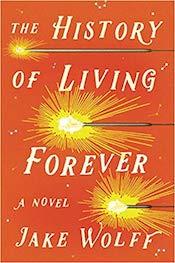Let’s begin with the same warning that Jake Wolff provides at the beginning of his provocative novel: The History of Living Forever. What he claims (although I haven’t verified this) is that “the first edition of a Woman’s Day cookbook in the late 1970s shipped with an error: its recipe for custard instructed readers to place a sealed can of condensed milk into a Crock-Pot for four hours.” You can guess what would happen if people followed that guideline. Wolff’s warning concludes: do not use the recipes in his novel; they will kill you. Guess what? As a read the novel, I totally forgot about his warning. I didn’t try to follow the recipes for living forever (the ingredients would be next to impossible to acquire) but I began to believe that the accounts of so-called real people, down through history, that are mixed in with his contemporary narrative) were genuine: that convincing is The History of Living Forever. And I kept sneaking a look at the index of the remaining chapter titles because I was so worried about the outcome for the main characters who I knew would eventually try one of the recipes. In short, that’s a pretty compelling story—or a page-turner to use another term, something not generally applied to an intellectual novel.
Here’s the contemporary story: Conrad Aybinder, a sixteen-year-old high school junior, falls in love with his science teacher and the two of them become sexually involved during the summer before the young man’s senior year. His teacher, Sammy Tampari, is not only a chemist but also an alchemist; and the older man dies suddenly just  before Conrad’s senior year begins. Conrad is convinced that his death is a sign, a puzzle that he must put together, and if he can decode Sammy’s notebooks that he will be given a gift: a recipe to cure his own father’s alcoholism that will shortly kill him. Conrad relates the story of what he did years later after he is married and his husband has a brain tumor that may or may not be curable. We, as readers of the story, know that both men in Conrad’s life (his father and his husband) are likely to die without Sammy’s elixir of life recipe that he has gifted to Conrad by his own death.
before Conrad’s senior year begins. Conrad is convinced that his death is a sign, a puzzle that he must put together, and if he can decode Sammy’s notebooks that he will be given a gift: a recipe to cure his own father’s alcoholism that will shortly kill him. Conrad relates the story of what he did years later after he is married and his husband has a brain tumor that may or may not be curable. We, as readers of the story, know that both men in Conrad’s life (his father and his husband) are likely to die without Sammy’s elixir of life recipe that he has gifted to Conrad by his own death.
If that sounds convoluted, it is because the notebooks that Sammy left Conrad not only reveal his own work to discover the elixir but, also, the personal aspects of his life. Sammy was brilliant and probably could have become a distinguished professor of chemistry had he not devoted himself to the elixir of life. He was also initially straight and had a lengthy relationship with a woman that crashed because of his dog headedness to pursue his impossible dream.
I call this a horror story because of the accounts of people dying from earlier attempts to discover the elixir, most of them by ingesting mercury. Even without an iota of knowledge about chemistry, I know that that’s a very dangerous thing to do, but I need to stress that in the vignettes interwoven throughout the contemporary story and in a timeline of “Notable Moments in Self-Experimentation” also at the beginning of the novel, I was convinced that Jake Wolff was not making this stuff up but relating actual events.
The novel’s sweep of Sammy’s life includes a lengthy section that takes place in Romania—the slowest part of the novel—that permits Conrad to meet Sadiq, who was Sammy’s first male lover. The Romanian section also introduces a couple of sleazy characters also supposedly involved in discovering a key to longevity. There are other surprises here that I will not divulge but, as crazy as some of them are, Conrad finally reaches a level of awareness about the entire debacle that unfolded because of his sexual relationship with Sammy:
“Sammy wrote that people see the elixir of life as against the laws of nature—to wish for it is amoral, to search for it is hubris. But I have wished for it, and I have searched for it, and here’s the closest I’ve come to a revelation: In hindsight, searching for Sammy’s elixir felt no different from searching for a job, for a boyfriend, for a house that’s big enough (but small enough) to call home. It’s just another thing I’ve wanted, among many other things, at some point in my life.”
Jake Wolff’s profound novel, The History of Living Forever, will entertain you and simultaneously make you think, make you question your own reasoning about living longer than what nature intended. It’s a question of beating the odds, of winning the lottery, or—for believers—of playing God. As for myself, I’m happy enough to accept what was served to me.
The History of Living Forever
Jake Wolff
Farrar, Straus and Giroux. 384 pp. $27